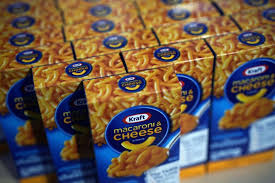Kraft Heinz Faces Reckoning of its Own Making

The collapse of Kraft Heinz stock, caused by the shocking announcement of a $ 15.4-billion writedown, confirms what many in the food industry have long suspected: The company is a one-trick pony, and now it can’t do that trick anymore.
Kraft Heinz disclosed on Thursday that its Kraft and Oscar Mayer brands, two of the biggest and most storied brands in food, are worth $ 15.4 billion less than previously assumed. Investors, though they’d grown used to bad news from the company over the past several months, were staggered. In Friday morning trading the stock was down some 30%. One can only imagine the reaction of Kraft Heinz’s largest shareholder, Warren Buffett.
Here’s the problem. Kraft Heinz is run by 3G Capital, a private equity firm overseen by Brazil’s richest man, Jorge Paulo Lemann, and 3G follows a highly specific playbook. It buys control of a company, often in the food industry (Buffett teamed with 3G on Kraft Heinz), then fires most of the top managers and cuts costs drastically. When it bought Kraft in 2013, for example, it immediately wheeled out the office refrigerators stocked with free Kraft products, got rid of the corporate planes, and made everyone including the CEO fly coach. It institutes strict meritocracy and zero-based budgeting – every expense must be re-justified every year. Results improve dramatically.
That’s 3G’s one trick. The firm is far less skilled at innovating, brand-building, responding to consumers’ changing tastes, and otherwise growing organically. So typically a couple of years after buying a company and running the playbook, it must buy another company. That’s what it did in the beer industry over a period of decades until it merged the colossus it had built, AB InBev, with SAB Miller, creating a global behemoth that can’t legally get much bigger.
Two years after 3G bought Heinz (also with Buffett’s help), Heinz bought Kraft and combined them. After two more years Kraft Heinz tried to buy Unilever, but Unilever objected, and Buffett refused to participate in a hostile deal. Now, after four years without an acquisition, Kraft Heinz desperately needs one. But finding a target at the right price isn’t easy, partly because stock prices generally have risen so high and partly because the other players in Big Food have figured out the 3G playbook and are running it themselves before 3G can do it to them. The opportunities just aren’t there like they were when 3G was a little-known outfit from Brazil.
So what can Kraft Heinz tell investors now after disappointing them so bitterly? In the earnings call with Wall Street analysts, CFO David Knopf explained that the company was cutting the dividend and selling off weak brands in order to bring in cash that would “position ourselves against inorganic opportunities” and “position Kraft Heinz for industry consolidation.”
He was saying the only thing he could say. Stripped of the jargon, the not-very-encouraging message is: Somehow, sometime soon, we’ll find a way to do our one trick.
